HIT CHANNEL EXCLUSIVE INTERVIEW: April 2024. We had the great honour to talk with a legendary musician: Davey Johnstone. He is best known as the guitarist of the Elton John Band since 1971, playing on classic albums such as “Madman Across Water” (1971), “Honky Château” (1972) and “Goodbye Yellow Brick Road” (1973). He has also worked with John Lennon, Alice Cooper, Rod Stewart, BB King, Little Richard, Stevie Nicks and others. In 2022 he released his latest solo album called “Deeper Than My Roots”. Read below the very interesting things he told us:
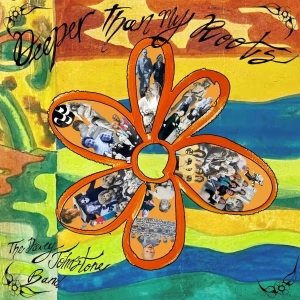 Are you satisfied with the response you got so far from fans and press for your solo album “Deeper Than My Roots”?
Are you satisfied with the response you got so far from fans and press for your solo album “Deeper Than My Roots”?
I got some wonderful responses. I ‘m very grateful to the fans who listened to it. I have many friends in the music world who really loved it; Elton really enjoyed it also. He phoned me when he heard it and he told me how much he enjoyed it and how much he loved the sound of my son’s voice, Elliott, who sings most of the lead vocals on the record. So, yeah, it’s been great!
All your children became involved in “Deeper That My Roots” album. How did it come about?
Mainly because of Covid, because when we were forced to stop working, we were in Australia in the middle of the Farewell Yellow Brick Road Tour and this is suddenly where we all heard about Covid, so we got back to the United States in March of 2020 and we realized nobody was gonna be working for a long time and we didn’t know how long. Nobody knew it was gonna be two years. So, after about six months I decided to start writing on my own because I hadn’t written any solo stuff for many years. I just kept writing and writing and composing new music and I got together with a good friend of mine, Rick Otto, who is a wonderful lyric writer and Rick helped me with some lyrics. I just started recording in the house with my son, Charlie, who is an engineer and a piano player. So, he was recording a lot of my stuff at home and then, as I just said, my son Elliott did a lot of the lead vocals. So, it came about kind of by accident. It was really like an accident but it was a very happy accident. I really enjoyed it.
I am addicted to “Melting Snow” from your “Deeper That My Roots” album. Please tell us everything we should know about this unbelievable song.
Thank you. It’s one of my favourites also. I wrote it because a very dear friend of mine in Scotland, an older gentleman, he had terminal cancer and he was dying. I got to meet him a couple of times and he was the most amazing man. So, I ‘ve decided to write a song about death, but about the good side of it: I hope people are grateful for the life that they had and they are sad to be dying and to be leaving this universe, but they are full of gratitude for the life that they had. So, they are just like the melting snow. You know, soon they will disappear and they will be gone but we will always remember them. Yeah, it was very special to me that song, so, I’m glad you like it.
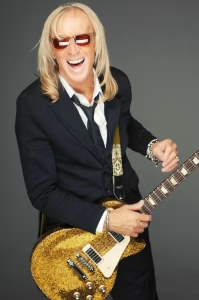 You play an aggressive solo on “Deeper”. What inspired you to play it like this?
You play an aggressive solo on “Deeper”. What inspired you to play it like this?
Well, I usually play the first things that come into my mind when I’m playing a guitar solo of any kind and usually those ideas are the best ones. So, when I was doing some guitar overdub on the song “Deeper”, for example, I just decided to do a solo on the spur of the moment. I wasn’t supposed to do one but I started playing what I felt and great things started to happen. So, I think that’s what I love about the kind of music that I ‘m involved in: There is a lot of feeling involved and a lot of the first instincts, which are usually the best ones in my experience. I don’t like to spend a lot of time brood over and over and over the same thing, so, I like to stay with my first ideas; they are usually the best ones.
Bob Birch’s (died in 2012) bass in “Black Scotland” is fantastic. What’s the story behind “Black Scotland”?
(Laughs) It’s a funny story, actually, because many years ago I was working with Little Richard, who I’ve been a big fan of since I was 5 years old, since I first heard him singing. I got to play with him a long time ago, in 1995 or something. But we were doing a rehearsal with him and we were playing one of his great songs called “Lucille” and he stopped in the middle of the song and he turned to me and he said: “Where are you from?” and I said: “I’m from Scotland” and he said: “Well, you must be from the black part of Scotland” and I thought that was a great compliment, a funny thing to say, so, I always remember it and I decided to call the piece “Black Scotland”.
Why did you decide to cover The Beatles song “Here, There and Everywhere” on your solo album and is this mandolin that I hear on this?
Yes, it is mandolin. The reason we did that was really an accident, again, because it was the first thing that we recorded before we knew we were gonna make an album. It was the very first thing. One day, I was sitting around, a little bit bored and my kids were in the house and they were a little bit bored too, but they are wonderful musicians and I said to them: “Why don’t we record something?” We went to Charlie’s room and because we all love The Beatles’ music I said: “What about this song?” and Elliott said: “Oh yeah, I know that”, even though he was very young when we started doing that; he is only 19 now, but he was 16 when we started doing that record. So, I just played the guitar part and he sang the lead vocal and then I decided to add some other things; mandolin was one thing that I decided to do on it, because it would be different for that song. Yeah, again, that was another accident because we didn’t mean it to do anything but it sounded so good to me that I thought: “Ok, maybe we can do more songs and maybe in a few months we have an album’s worth” and that’s what happened.
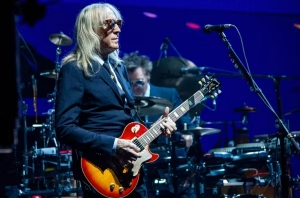 Are there touring plans for “Deeper Than My Roots” album?
Are there touring plans for “Deeper Than My Roots” album?
No. Not really, because I retired from touring last summer with Elton and you know, I felt I had enough touring in my life. I may do a couple of special shows, what you call an one-off show, where I might just show people that I still want to play but no, I am not gonna do a tour, it’s too much. I’m gonna be 73 next month; that’s too old to be touring. I am leaving the touring to the younger people. So, no. I’m gonna make another album, though. I am gonna make another record and this time I ‘ll be singing most of the lead vocals on it and I have some interesting new songs that I ‘m ready to write.
What are you feelings after the Farewell Yellow Brick Road Tour?
I’ve been working with Elton for over 50 years and we just did another concert two weeks ago in Washington, DC, so, we still do concerts together, we still talk on the phone and we are still good friends. We will always do little things together, but we are both much older now. We started doing work together when he was 25 and I was 20 and now I’m 73 and he’s 77 or something (laughs).That’s crazy. I feel good about it, I feel I did a lot of good work with him. Literally, it was amazing, but I’m happy to be finished with all that touring because we enjoyed it very much, but all things have to come to an end and I’m kind of glad it’s over.
What is the secret of your 50+ year collaboration with Elton John?
I think it’s all based on honesty with each other and the ability to laugh with each other; we both laugh funny stuff and jokes and stuff like that. We both love each other’s music, that’s never changed since the very first time we played together. It’s a magical thing between musicians: When you find somebody who shares the same kind of musical feelings and the same way you like to record music. We both like to record very quickly, we both like to rely on our love of music and our instincts. We don’t spend months and months and months making an album, we do it very quickly. It was a wonderful collaboration and I’ll still do a concert here and there. I believe he has an album coming out sometime later this year, like in September. I haven’t heard it yet and I didn’t play on it, so I don’t know what is like, but I’m sure it’s great, because Elton is a great songwriter and Bernie (ed: Taupin) is a wonderful lyric writer. So, I’m sure there are good things on the record.
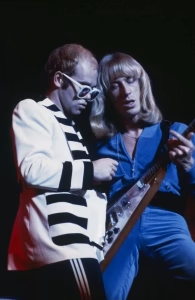 How did you come up with idea to play a backwards guitar solo on “I’ve Seen That Movie Too” (from “Goodbye Yellow Brick Road” -1973) ?
How did you come up with idea to play a backwards guitar solo on “I’ve Seen That Movie Too” (from “Goodbye Yellow Brick Road” -1973) ?
I ‘ve always loved The Beatles music and I loved when George Harrison (guitar) started doing that kind of thing on The Beatles’ “Revolver” (1966) record and I love the song with the backwards guitar. So, I use it on a couple of things: On background vocals that we ‘ve done on some tracks, and I should say on “I’ve Seen That Movie Too”. But when we were deciding what to play I felt the song was kind of creepy, interesting and very dark and I just felt that the backwards guitar would be an interesting guitar sound to put on there. It turned out very great, I was very pleased with it, it’s a very haunting sound.
So, could we say that “I’m Only Sleeping” (The Beatles) was a major influence on that?
Absolutely! Yes, absolutely! The Beatles have been a big influence on my musical career, all the way through. I still love The Beatles and I have very good friends. I mean, I worked with John Lennon back in 1974 and we had a wonderful year working and playing together. It was just wonderful to do that. I ‘m fortunate, I got to meet all The Beatles and to this day I’m a very good friend of Ringo. Ringo and I are dear friends. I ‘ve been inspired by that music and I think every single musician on the planet has been inspired by The Beatles. People take things from that music still to this day and that’s a good thing because they did it so well.
How much artistic freedom did you have on Elton John’s records?
100%. Complete freedom. Nobody told anybody what to play. Elton played piano and sang, Dee Murray played bass and sang, Nigel (ed: Olsson) played drums and sang and I played guitars, mandolins, banjo, sitar and sang background vocals. Nobody told anybody else what to play; we were always just doing what we felt it was our own musical expression and it was a magical thing. It’s very much like The Beatles, in a way. We were four people that came together with very magical ideas and they all worked and I still feel that’s what’s important in music: When people get together, who are good musicians, they find each other and they find their musical expression, what’s best when they are collaborating together. Yeah, we were very fortunate to be part of that magic. I feel very grateful I met those guys.
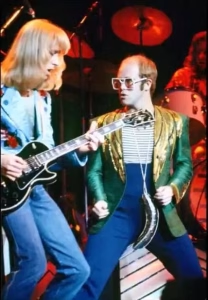 Did you enjoy playing with Elton John at Live Aid concert at Wembley Stadium in 1985?
Did you enjoy playing with Elton John at Live Aid concert at Wembley Stadium in 1985?
Yeah, it was a magical experience. To be honest, I wish we had played it with Dee Murray and Nigel Olsson because the band we had then, really, we were just trying things out. It was a new band based on a record that Elton just made (ed: “Ice on Fire” -1985), so we were full of session players and other people like that. It wasn’t a band as close as this to my heart, so I really wish I had done it with just the four of us: With Elton, Dee, Nigel and me, because that was the magic combination. Really, Queen were the best thing on that bill that day. The Queen performance was unbelievable and so great. I cherish the magic of a smaller group, I ‘ve always enjoyed a smaller band rather than a big band. I ‘ve never liked too many people on stage. To me, everything becomes too diluted when it’s like that. I like a smaller band, it’s more punchy.
How important was the contribution of Gus Dudgeon (producer) to the success of Elton John?
Of huge importance. Gus was absolutely brilliant. Also, Gus and I were good friends and he was very much responsible for bringing me along to play on some of Elton’s music in the early days. I had never met Elton, so, he was the one who suggested I play on “Madman Across the Water” in 1971. If that hadn’t happened, I don’t think the rest of the music would have happened. Gus was very responsible for all that success. And his work; he was a brilliant record producer. To me, there aren’t many record producers left. People who call themselves record producers, in this day and age, I don’t believe they are real producers. Record producers in my mind should understand engineering, great music sounds, how to get the best tones out of a guitar amplifier, how to make up a piano… People have left that skill in this day and age. Too much goes to digital tricks and things like that. That’s what the passage of time does. It’s just my own personal taste, I prefer the way that we used to record to the way music is recorded nowadays.
John Lennon joined The Elton John Band on stage at Madison Square Garden, NYC on 28 November 1974. It would be his final concert performance. Do you have any memories of that concert?
Yes, we all do. It was a very wonderful experience because John and the rest of us had been working all the year. He came to visit us at Caribou Ranch (ed: a studio in Colorado) where we were making “Captain Fantastic” (1975 -recorded in 1974) album. We were in the studio one day and we decided to record “Lucy in the Sky with Diamonds” and we did a wonderful version of it and John and myself played guitars on it together. Then, we recorded a couple of other songs and he travelled with us during our tour in that year. When he came on stage with us in Madison Square Garden, it was a wonderful experience and I ‘ll never forget it. I ’ll remember it until I die and I think every person who is alive today, remembers that show or remembers how special it was. It was incredible.
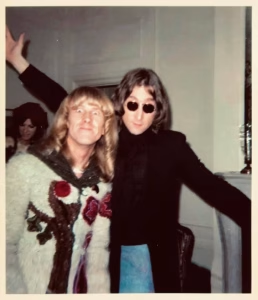
Were you surprised when you saw John Lennon so nervous backstage before the show?
A little bit, because he is a Beatle, you know. You think if you are one of The Beatles, you never get nervous, but of course, John is human like everybody else. Yeah, he was very nervous but we had a joke: He came into my dressing room where I was tuning the guitars and he asked me to tune his guitar and we had a bit of a joke and it made him feel better. But yeah, he was very nervous, but he hadn’t played live for many years. We are all human, we all get nervous, we all get scared, but as soon as he came on stage, we realised how much love was there for him from the audience and it was amazing. He really enjoyed it.
How did it happen to record on John Lennon’s song “Whatever Gets You thru the Night” (from “Walls and Bridges” -1974)?
We travelled to New York on the SS France, which is a ship which had its last voyage from Southampton to New York City. We arrived in New York and John met us at the docks at New York Harbor because he had brought his son, Julian, for a visit with his dad. John invited us to the studio where he was recording a new album; we got there and he was recording “Whatever Gets You thru the Night” and John asked Elton to play piano on it and he did and it was great and it turned out to be a great record.
Could you describe to us your feeling when John Lennon knocked the door of your hotel room the day after the Madison Square Garden show?
It was actually that night, it was after the concert. It was a few hours after that concert and it was wonderful because John Lennon and all The Beatles were obviously incredibly special to me, in every way. The work he did, not only as a writer and a musician and a guitar player, but also as a human being, all the stuff that he did for peace and love. So, yeah, when he came to hang out with me we had a wonderful five or six hours together, just playing music and drinking, laughing, joking and having fun and it was wonderful experience and one that I will always remember and always be very special to me and it made more important by the fact that he is not with us anymore. When he was killed, it was just the worst thing imaginable for our whole planet, because another special person was taken away too early; somebody who was fighting for peace, equality and race relations. Yeah, it’s sad to me that so many great people like that get taken too early.
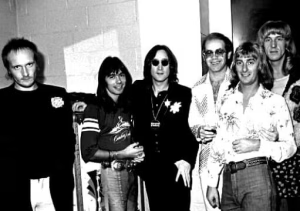
How much has your approach to guitar changed over the years?
Not very much, because I’m not a guitar player who sits down and practices all the time. I don’t consider myself a really technical guitar player. I’ve always played things that I feel are appropriate for a song. I ‘m very good at making a song better by the stuff I play on it. I feel that’s always been my strength and I still do that. If anything, my playing has improved especially in the last few years, since I ‘ve been playing my own music again, I have more of the chance to do exactly what I wanna do, instead of just playing background to other people’s songs, although I ‘ve enjoyed doing that not only with Elton, but many people I’ve enjoyed playing over the years: With Stevie Nicks, The Pointer Sisters, Lenny Kravitz… But I believe that I’ve become a better player but hopefully that will last for a few more years before my hands get too old to play (laughs).
By the way, have ever discussed with Elton John about his audition for King Crimson?
For King Crimson?! I’ve never heard about that.
You played and co-wrote songs with Alice Cooper on his “Flush the Fashion” (1980) album. Did you have a good time working with him?
Oh yeah, I love Alice, we are good friends to this day. Alice and his wife, Cheryl, are wonderful people. Alice is a wonderful artist, always has been. When he started his own career I was very young and I was living in the UK, but Alice and his manager, Shep Gordon had a wonderful vision: The whole idea of creating this character who would be very nasty and aggressive, blood everywhere, dark circles around his eyes and just great dark ideas. But he became the godfather of heavy metal or hard rock and he still is. He still is the guy, to this day. He is still touring, I love Alice to this day. We talk and we are good friends.
Roy Thomas Baker (Queen producer) produced “Flush the Fashion” album. Were you satisfied with his job on this album?
Yeah, a wonderful producer. Roy Thomas Baker is a great producer, I love all the stuff with Queen, The Cars and stuff like that and we worked together on a couple of projects. Yeah, Roy is wonderful and I thought he did a great job on “Flush the Fashion”.
Did you enjoy listening to “Tiny Dancer” in “Almost Famous” (2000) film?
Sure. Yeah, it’s a great song.
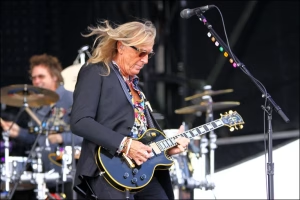 My favourite bass player is Scottish, Jack Bruce. Did you get to know him?
My favourite bass player is Scottish, Jack Bruce. Did you get to know him?
I met Jack Bruce a few times. I mean, there are a lot of great musicians from Scotland, really great ones and Jack was wonderful. He created a wonderful legacy with Cream and just in general with all the different things that he did. Yeah, I’m very proud to be a Scottish musician, it’s a very small country and they ‘ve been many great musicians out of there. One of my favourites right now is a young musician and songwriter called Callum Beattie. Check him out, he ‘s incredible!
Had you ever met Freddie Mercury?
Oh yeah, we were friends. I love Freddie, a lovely person.
A huge “THANK YOU” to Mr. Davey Johnstone for his time. I should also thank Billy James for his valuable help.
Buy Davey Johnstone’s “Deeper Than My Roots” album here: https://www.cherryred.co.uk/product/the-davey-johnstone-band-deeper-than-my-roots/
Official Davey Johnstone Facebook page: https://www.facebook.com/johnstonedavey/
Official Davey Johnstone Instagram page: https://www.instagram.com/daveyjohnstone/

